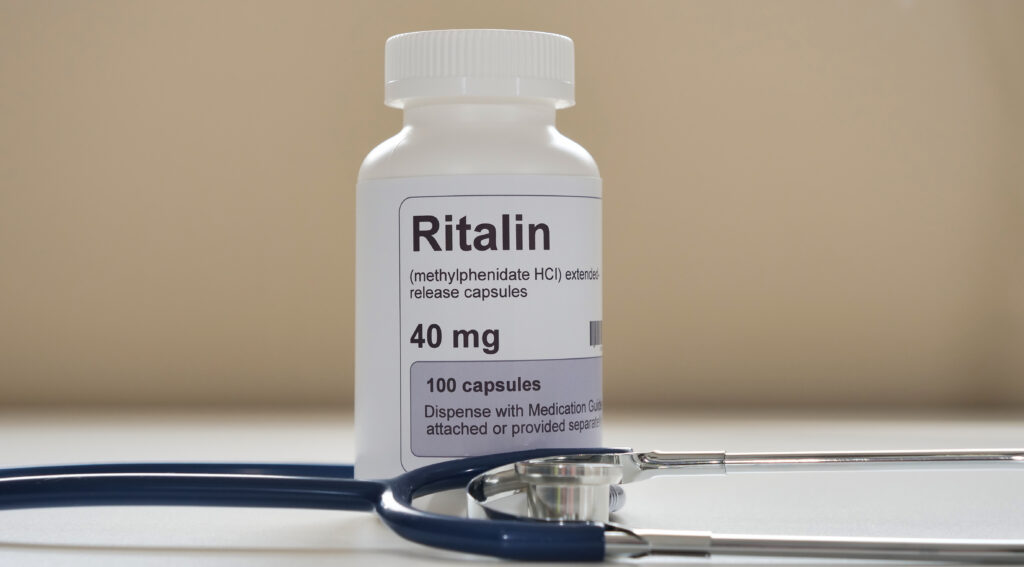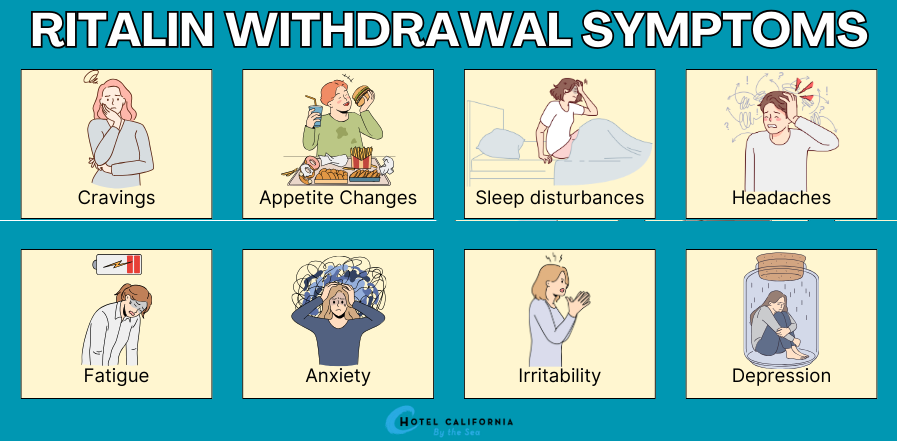Ritalin Withdrawal
Adderall and Ritalin are prescription stimulants used to treat symptoms of ADHD. Due to the nature of the drug, they carry a high potential for abuse and dependence and have been labeled as Schedule II controlled substances. These prescription stimulants are often abused by young professionals and students to help them improve productivity. It is also abused by athletes to help them enhance their physical performance. In fact, Adderall is used by an estimated 76% of stimulant abusers and Ritalin is used by an estimated 24.5% of stimulant abusers. Due to its widespread availability and accessibility, recent studies have shown a significant increase in Ritalin abuse and addiction.

Ritalin is a central nervous system stimulant drug surrounded by decades of controversy. Ritalin is the brand name for the generic drug methylphenidate. Similar to Adderall, it belongs in the stimulant class of drugs and is FDA-approved to treat conditions such as ADHD and narcolepsy. Some off-label uses of the drug include treatment for binge eating disorder, depression or chronic fatigue syndrome.
It is often abused for its stimulant and euphoric effects. The drug carries a very high risk for psychological and physical addiction. Long-term and short-term misuse of the drug can lead to severe adverse effects. Like other stimulant drugs, sudden cessation or a drastic decrease in drug use can lead to Ritalin withdrawal. The risk of severe withdrawal increases with heavy or prolonged use of the drug. In order to safely detox from Ritalin, it is recommended to taper off the medication under the guidance of a medical professional.
What is Ritalin and how does it work?
Back in 1955, Ritalin was marketed as a medication to help children with ADHD. Today, data shows up to 19% or more of adults are now being prescribed ADHD and the use in children is actually declining. The surge in prescription stimulants rose in the 1990s and led to a steady increase in recreational use and abuse of the drug. The use of these types of drugs is so widespread that in the US alone, it produces and consumes an estimated 85% of the world’s supply of Ritalin.
Ritalin works by impacting the dopamine and norepinephrine levels in the brain. Norepinephrine is a neurochemical that impacts functions such as alertness, attention and focus. Dopamine plays a role in pleasure, memory and mood. Ritalin crosses the blood-brain barrier, blocks the reuptake of both neurotransmitters and keeps levels of these brain chemicals high. This helps to increase attention span, increase levels of focus and increase impulse control.

Side Effects of Ritalin Use
- Abdominal pain
- Anxiety
- Decreased appetite
- Drowsiness and fatigue
- Headaches
- Irregular heartbeat, heart attack or stroke
- Increased blood pressure
- Irritability and aggressive behavior
- Nausea and vomiting
- Insomnia
- Weight loss or gain
- High blood sugar
- Brain damage
- Blurred vision
- Seizures
For users with ADHD, taking the prescription medication as per the recommendation, is very effective. However, for users who do not have symptoms of ADHD, Ritalin can produce a much greater output of dopamine levels that can lead to drug use compulsion.
Ritalin works very similarly to other stimulants and often targets the brain’s reward system. This is often the case with recreational users who become dependent on the drug. When a person has developed a dependence on Ritalin and then drug use has abruptly stopped or drastically decreased, it can cause physical and emotional withdrawal symptoms.
Ritalin Withdrawal
Ritalin withdrawal occurs when a user abruptly stops using Ritalin after intense and prolonged use. The body has adapted to the presence of the drug and now needs to rebalance itself without the drug. Dependence on Ritalin occurs because of an increased tolerance for the drug. This requires higher doses or more frequent doses over time in order to experience the same effects. The most effective way to detox from Ritalin is through a medical taper with professional guidance. This means a lower dose of the drug that decreases over a certain amount of time can help users avoid difficult and uncomfortable withdrawal symptoms.
There are many different factors that impact the severity of Ritalin withdrawal.
- Duration and dosage. The higher the dose and the longer a user has been taking Ritalin, the more severe and difficult managing withdrawal can be.
- Physiology. Everyone has a different physiology and responds to the drug differently.
- Level of dependency. The level of dependency can impact the severity of the withdrawal symptoms a user can experience.
- Co-occurring mental health conditions. Underlying mental health conditions such as anxiety and depression can lead to exacerbated withdrawal symptoms.
- Use of other substances. If the user is also abusing other substances, it can impact the intensity of withdrawal symptoms from Ritalin.
Check Your Insurance Coverage for FREE
Find out if your insurance covers addiction treatment in minutes. We accept most insurance!
Common Ritalin Withdrawal Symptoms
- Loss of focus
- Depression and anxiety
- Mood swings and irritability
- Blood pressure changes
- Hyperactivity
- Fatigue
- Difficulty concentrating
- Sleep issues
- Decreased motivation
- Suicidal ideation
- Hallucinations, delusions and paranoia
How long does Ritalin Withdrawal last?
Ritalin withdrawal typically starts within 24-72 hours after the last dose. The general half-life of Ritalin is around 2-3 hours. This means the onset of withdrawal symptoms can occur rather quickly after cessation of drug use. The shorter the half-life of the drug, the more immediate the onset of symptoms. Heavy and long-term use of the drug can lead to intense and long-lasting withdrawal symptoms that can go on for several months. The duration of withdrawal is dependent on the individual user. Those who are more sensitive to the drug may also have longer-lasting symptoms. Withdrawal symptoms are typically the most severe within the first 7-10 days and will slowly reduce over time.
Withdrawal Timeline
- 24-72 hours. During this time the onset of withdrawal symptoms can include fatigue, mood swings and difficulty with concentration. This period is generally where the most intense symptoms occur.
- 1 week. Within the week, symptoms will begin to peak with users feeling irritable, anxious and experiencing sleep problems.
- 2 weeks. During this time there will be an improvement in symptoms with some linger effects in mood swings and energy levels.
- 1 month. By this time the withdrawal symptoms have generally subsided. However, there can be an instance where there is a recurrence of lingering symptoms. This is commonly referred to as PAWS, where sleep issues and cravings for drug use continue to linger.
Who are the most susceptible to Ritalin dependence and withdrawal?
People with a history of substance abuse or any other underlying medical condition are at risk of developing a dependence on Ritalin. Those who experience heightened focus, increased energy, or enhanced moods are also prone to abuse of Ritalin. Ritalin can become an addictive drug when not taken as per the recommendation of a medical provider. In cases of recreational use and drug abuse, it can cause a user to develop drug-seeking behaviors leading to drug tolerance, dependence and addiction.
Reach out to Hotel California by the Sea
We specialize in treating addiction and other co-occurring disorders, such as PTSD. Our Admissions specialists are available to walk you through the best options for treating your addiction.
Treatment for Substance Use Disorder
Ritalin addiction can manifest and grow after months of taking the medication. Those who recreationally use the drug do so to feel an increase in alertness and concentration. This is often a desired effect by professionals, students and athletes as they try to increase production or performance. However, once drug use has stopped, it can easily lead to uncomfortable withdrawal symptoms and even be a gateway for illicit drug abuse.
Hotel California by the Sea provides specialized treatments for those who have developed an unhealthy relationship with substances such as Ritalin and prescription stimulants. We offer treatment at all levels of care including detox, residential, PHP and IOP. We utilize evidence-proven techniques such as CBT, DBT and EMDR therapy. At Hotel California by the Sea, we are dedicated to helping our clients achieve sobriety and overcome their addictions.
References:
https://recovered.org/stimulants/ritalin-methylphenidate/withdrawal
https://www.alternativetomeds.com/blog/adhd-ritalin
https://www.addictioncenter.com/stimulants/ritalin
https://www.verywellmind.com/is-ritalin-addictive-21911
https://www.addictionhelp.com/prescription-stimulants/ritalin
https://www.choosingtherapy.com/ritalin-withdrawal/
